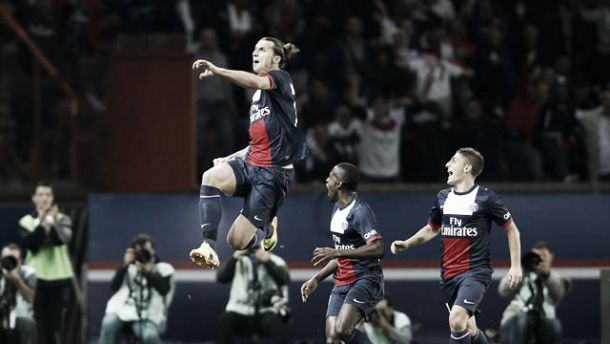After a some years in the wilderness of European football’s elite, La Championnat suddenly erupted back into the wider European scale when Nassar Al-Khelaifi purchased Paris Saint-Germain to enforce the club as one of Europe’s most powerful teams. The league had spent the majority of the previous decade lumbering and suffering from the effects of the success of the national team, which saw the majority of the players find moves to some of Europe’s top leagues.
When you step back in time, people remember the great Monaco sides of George Weah or the Saint-Etienne team that played home to one Michel Platini. However, with the exception of Olympique Lyonnais who dealt the UEFA Champions League giants shocks with some major defeats during their reign as French champions and a great season by Monaco in 2004, dominance in Europe has avoided any French team.
Spending of marquee signings and breaking records is not something French clubs are used to in recent times but this all changed on the faithful day when Nassar Al-Khelaifi came to the beautiful and vibrant French capital, Paris in 2011. PSG’s financial power quickly became evident when they managed to outbid both Manchester City and Chelsea, two of Europe's big players in terms of squads and stature, to purchase Palermo midfielder Javier Pastore, for a French league transfer record of €42million. The signing of Pastore furthered showed the power that the 70% investment of the Qatar based group had brought the club. The eyes of the European media were quickly shifting towards France and spending was increasing the strength of the league whilst the quality of players became of a higher standard for the first time in over a decade.
PSG’s power was further evident when two-time UEFA Champions League winner, Carlo Ancelotti, became Europe's highest paid manager when the Italian was attracted to the French capital to undertake a contract to the value of €7million per year. The figures capture the imagination when you compare Olmpique Lyonnais during their dominance of French football could only offer manager Paul Le Guen less than €1million per annum.
PSG may have continued to spend beyond their wildest dreams of only two years previous. On the other hand, Olympique De Marseille was a vast contrast in comparison to the want to be crowned French champions. During the 2012/2013, Paris Saint-Germain claimed their first victory in Ligue 1 under the Qatar ownership. Second placed Marseille spent total €3.2million on course to claiming second placed whereas Ancelotti’s PSG spent more than €156million to win the league by twelve points.
Zlatan Ibrahimovic, Thiago Silva, David Beckham, and Lucas Moura all joined the French champions for wages reporting €700,000 a week combined. Figures of this sort had been a far-cry from the events of years gone by when players had been departing the productive league in course of higher wages and success elsewhere. Now, players in search of a big move were being attracted to Ligue 1 in the hope of a long-term contract at France’s most powerful clubs after the signings of a handful of Serie A’s star-men.
When PSG’s successes became clear, other owners became intrigued at creating a project in France. Tax-costless heaven Monaco was the attraction for Russian billionaire Dmitry Rybolovlev’s takeover of the 2004 Champions League finalists and went on to purchase the club which seen them relegated in 2012. Besides being able to live in a modern, picturesque and vibrant city, Monaco can offer you all of this along with a chance of being part of this huge footballing project. The immense financial benefits the club can provide due to living in a city that still remains tax costless became the focus of attention for many money-desirable players. Yes it may be a pull factor beyond the control of the club but when Radamel Falcao joined the club in 2013, eye-brows were raised as to the motivates of the Colombian striker, who was seen by many as the best striker in the world.
With all this financial power and extra economic activity occurring in France’s two most iconic cities, critics will argue the league’s competitiveness will be damaged to due the vast net expenditure from last seasons top two. On the other hand, this hasn't been the case. Yes, the title race is becoming a wider gap that is difficult to close down, but races for Champions League places and Europa League places have been made even closer in recent times. Last season the title race seen two clubs reach over the 80 point mark for the first time in French football, further evidence of the positivity of the spending on the league in general for viewership figures. The power and, in some cases, greed of some players has proved to have had positive affects on the championship, an issue that should not be attempted to be averted as economically it's making sense for any stakeholders.
One positivity of the enormous spending seen by the elite in France, has seen the concentration on youth which has become the emphasis of many clubs to continue the re-building of their financial power. The latest big name youth player to make a multi-million euro move saw highly rated Saint-Étienne defender, Kurt Zouma, move to Jose Mourinho’s Chelsea in January of last year. Saint-Étienne in the past twelve months have been forced to part ways with another star-player when Pierre-Emerick Aubameyang left the green of Saint-Étienne for the yellow of Borussia Dortmund. He may not have come through the team in the same way Zouma had, however, it adds further emphasis onto ability of French teams to commence their scouting talents and purchase youngsters for a minimal fee whilst selling onwards to add to a major profit for the club in hand.
Nantes in Western France, a club who have yo-yoed through the divisions in the past decade with financial constraints put upon the club due to the owners economic power, have placed youth development at the height of the clubs priorities. Jordan Veretout, Nantes’ young and dynamic midfielder, has attracted the attention of some of France’s top clubs in recent seasons furthering showcasing some clubs necessity to produce quality young players to continue their re-devlopment and continue their progress up the leagues.
Arguably, only the Bundesliga in Germany is producing so many top talents in the European game as France are at this current stage. This is difficult to deny when the nations under-20 national team became the world champions in 2013 when they replicated the senior side of 1998, to win the tournament the country was hosting. Players such as Paul Pogba, Florent Thauvin, Kurt Zouma and Geoffrey Kondogbia were all members of Pierre Mankowski’s victorious side. Now residing in Turin with Juventus, Pogba has managed to battle his way through the Le Harve academy to make moves Manchester United and Juventus. Pogba was a number of squad members linked with big money move to clubs this seasons due to their impressive performances for both club and country.
When you compare the expenditure in the Premier League and La Liga by the major clubs in both divisions, the emphasis on youth is lacking in comparison to Ligue 1. Critics will remain constantly with the spending of PSG and other French giants, but what often goes ignored is the youth products created due to the spending. Development in national team success is increasing whilst the majority of Ligue 1 teams are making enormous profits due to eye-catching displays from players who once progressed via the guidance of the clubs. It can't be denied that both power and greed have had a positive affect on the league as a whole. Youth development is increasing and the strength and quality of players are continuing to rise. This is no doubt the most exciting part of French domestic football since the early 1990’s. Hopefully national team success and European success will see Ligue 1 reap the rewards after a difficult period in the leagues history.










































